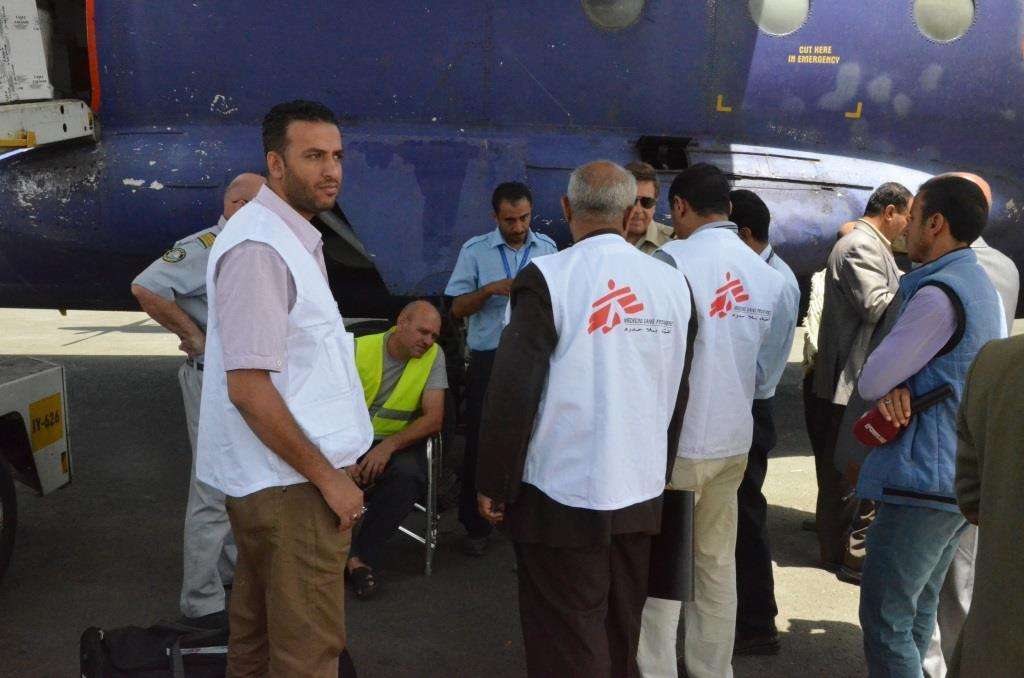Husni Mansoor is a nurse supervisor working with Doctors Without Borders/Médecins Sans Frontières (MSF) in Aden, Yemen. This account was originally published in The Guardian (UK).
I have been living and working in Médecins Sans Frontières’ hospital since the clashes began in March. I’ve only been able to leave the hospital twice since then. The first time was to refer a patient to a specialized hospital as his life was in danger. Thankfully, he is now alive and well.
The second time was to participate in the burial of a dear friend who had died. He was an administrative employee in a local hospital but was working as a volunteer to provide first aid to the injured. One day, he was transferring an injured patient to the hospital. The car was going fast; there was no ambulance and they were using an open pickup. My friend fell from the car and was taken to a hospital.
I was not able to visit him, as I was busy here; we were receiving many cases and it was important for me to stay in order to supervise the nurses, nursing assistants, cleaning staff, and others. On the third day after his injury, I received news of his death. The second time I went outside the hospital was to say farewell to my friend and participate in the burial. He was a pleasant, hard-working, and brave person.
Read: "Expecting Death From Anywhere" in Yemen
My family left with our neighbors to an area outside Aden for their own safety. I wasn’t able to see them or say goodbye. My house is not far from the hospital, about 3 kilometers away, but it feels like thousands of kilometers.
I cannot go and check if everything is OK there. I heard from some neighbors that our neighborhood has been affected by shells, but I don’t know the condition of my house. Is it locked? Have the windows been broken? Has it been robbed?
All I do is work and eat and take some rest if I can. Often, I try to sleep but am woken by an emergency and have to make sure everything is going as planned in order to receive the injured.
We are still receiving significant numbers of patients despite the fact that many have difficulties reaching the hospital. Some patients told me they had to pay 10 times [more] for transport compared with prices before the clashes, so they are the ones who make it to the hospital. So, for a trip that used to cost 500 Yemeni rials (about $2.50), some people are now paying 5,000-6,000 rials to come to the hospital.
This amount is difficult to afford in the current circumstances, especially as so many people have not received their salaries due to the bank and post offices and foreign exchange centers being closed, and the extreme difficulty of movement in the city.
Food and water are additional problems, besides fuel shortages and the deteriorating security situation in Aden. Some of my neighbors say that they are taking two meals and sometimes only one meal a day after having to wait in long queues to buy food.
It is the same problem with water, with people having to queue with jerrycans. We are facing all this in the hot summer of Aden, which gets hotter every day. Though we usually have food for the people in the hospital, sometimes we face problems providing it as we cannot go out. Restaurants and grocery stores are closed in areas where there are clashes.
Our biggest fear is that the fighting will surround the hospital. Many times, when the clashes intensify, we go down to the basement. But this creates a different problem. Before we save ourselves, we move the patients who are in beds near windows to a safe place.
This has happened many times. We hear the sound of gunshots and shelling or air strikes and we move all the patients to safe areas before finding a safe place for ourselves. Windows at the hospital have been broken more than once and bullets have entered, but no one has been hurt inside the hospital.
Some of our medical team in Aden have lost family members due to the fighting. Some have lost a father, a brother, a friend. Sometimes members of the team leave the hospital to check on their families and we hear nothing about them for a week or two due to the bad telecommunications coverage or the unstable security situation, which forces them to stay home.
I have no idea how long things will stay like this. I am very sad to see what has happened to Aden. A friend of mine tells me that I will not believe my eyes if I go to the Crater district of the city now. Crater is my favorite place in Aden, and I have many beautiful memories of being there.
We have to forget about our pain and motivate ourselves to continue working and providing healthcare to patients. As for the ceasefire we heard so much about, we have not felt it here in Aden.




